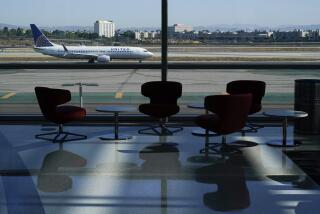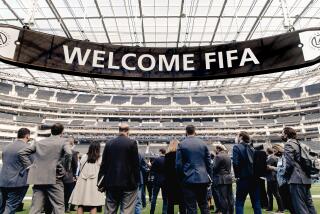Experts say Brazil is unlikely to be ready for 2014 World Cup
- Share via
BOGOTA -- Although doubts about Brazil’s readiness to host next year’s World Cup have focused on renovations at 12 stadiums, some Brazil trade experts say they are more concerned about travel logistics and whether airports, mass transit systems, hotels and railroads will be up to handling the crush of visitors.
“The infrastructure behind the games is what will be complicated for Brazilians and foreign tourists,” said Marcelo Rocha e Silva Zorovich, a Sao Paulo business consultant who is a visiting researcher at the University of Miami. Despite $15 billion in government investments, Zorovich said, he has grave doubts.
Gary Hufbauer, a senior fellow at the Petersen Institute for International Economics in Washington, was more emphatic: “The World Cup will give Brazil a black eye.”
“We’ll make it to the Cup but the infrastructure won’t be ready,” Zorovich said, adding that major concerns are topped by the 12 host city airports. As of March, only 2% of $3.3 billion budgeted to improve the facilities had been spent, according to Reuters.
Highest on the list of substandard airports is Sao Paulo Guarulhos International, where many of an estimated 3 million tourists are expected to arrive. It was recently ranked the worst of 26 major Latin American airports surveyed by Latin Trade magazine.
Barbara Kotschwar, also a research fellow at the Peterson Institute for International Economics, noted that before World Cup preparations began, Brazil overall ranked “dead last” among South American countries in air transport infrastructure.
Zorovich and others had hoped Brazil’s need to build infrastructure for the World Cup and the Olympic Games in 2016 would expedite $1-trillion of public works that leaders have promised this decade. Brazil’s notoriously inefficient roads, airports, rail and port systems are the root of the so-called “Brazil cost,” as the added expense of doing business there is dubbed.
But the projects have been slow in coming, and the cost has only increased in recent years, Zorovich said.
“It’s gone up, for the same reasons that millions of people took to the streets to protest over the last month. The reasons are corruption, a high cost of living, the rise in inflation and a heavy tax burden.”
His pessimism stems from the failure of government to deliver on projects such as mass transit systems, road improvement, and in the case of Belo Horizonte, a convention center. Some localities laid the blame for the lack of follow-through on the need to divert funds to stadiums plagued with cost overruns. In Rio de Janeiro, upgrades to Maracana stadium may cost $500 million, twice the original estimate.
Adequate hotel rooms are another source of worry, Zorovich said. Rio promised to add 22,000 rooms by 2014 but will be lucky if half that number are available, experts say. So where will visitors stay? Rio plans to berth six cruise ships in Guanabara Bay to house tourists, but doubts persist as to whether the port will be revamped in time for the opening ceremony.
ALSO:
Spain derailment: Two official investigations launched
China indictment: Bo Xilai bribery trial could begin soon
Tunisian opposition figure shot; second assassination this yearKraul is a special correspondent
More to Read
Sign up for Essential California
The most important California stories and recommendations in your inbox every morning.
You may occasionally receive promotional content from the Los Angeles Times.










